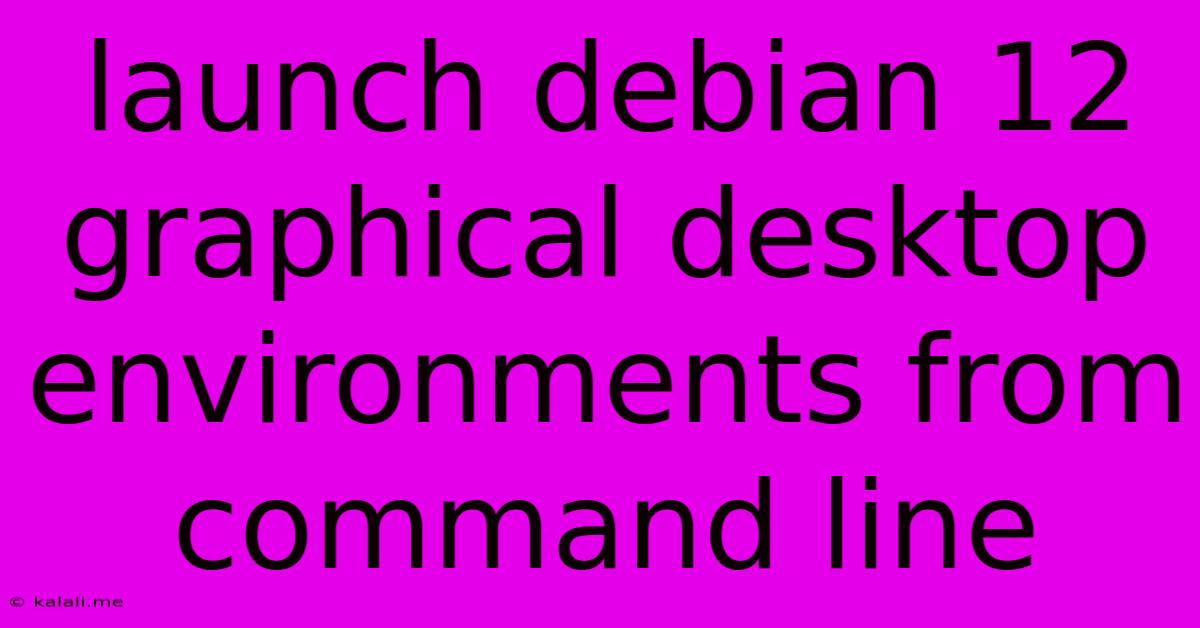Launch Debian 12 Graphical Desktop Environments From Command Line
Kalali
Jun 01, 2025 · 3 min read

Table of Contents
Launching Debian 12 Graphical Desktop Environments from the Command Line
This guide outlines how to launch different graphical desktop environments (GDIs) on Debian 12 (Bookworm) directly from the command line. Being able to do this is useful for troubleshooting, automation, or simply switching between desktop environments quickly without navigating through a graphical menu. This is particularly handy if you're working remotely or in a headless environment.
What are Graphical Desktop Environments?
Graphical Desktop Environments (GDIs) provide the visual interface you interact with on your computer. Popular examples include GNOME, KDE Plasma, XFCE, and MATE. Debian 12 offers a diverse range of these, allowing users to choose the environment best suited to their needs and preferences. This article focuses on launching these environments from the terminal.
Prerequisites:
Before proceeding, ensure you have the necessary GDI packages installed. If you haven't already installed a specific GDI, you'll need to use your package manager (apt). For example, to install GNOME:
sudo apt update
sudo apt install gnome
Replace gnome with the appropriate package name for your desired GDI (e.g., kde-plasma, xfce4, mate-desktop).
Launching Desktop Environments:
The method for launching each GDI varies slightly, but generally involves invoking a specific command. Here's a breakdown for some popular options:
1. GNOME:
The command to launch GNOME is straightforward:
gnome-session
This will start the GNOME desktop session. You might need to log in again.
2. KDE Plasma:
KDE Plasma uses the startplasma-x11 command:
startplasma-x11
This starts the KDE Plasma desktop environment. Similar to GNOME, a login prompt might appear.
3. XFCE:
XFCE's start command is:
xfce4-session
This initiates an XFCE session.
4. MATE:
For the MATE desktop, use:
mate-session
This launches the MATE desktop environment.
5. LXDE:
If you prefer the lightweight LXDE environment, use the following command:
lxsession
This starts LXDE.
Important Considerations:
-
Display Manager: These commands launch the desktop session without a display manager. If you're already in a graphical environment, this generally works fine. If you're starting from a text-only terminal (e.g., via SSH), you might need a display manager like GDM3 or SDDM running separately.
-
Multiple Sessions: Launching a new GDI this way will create a new session, not replace your existing one. You'll need to close the new session to return to your previous environment.
-
Permissions: You'll likely need root or administrative privileges (
sudo) for some of these commands depending on your system's configuration.
Troubleshooting:
If you encounter errors, check that the relevant GDI packages are installed correctly. You might need to adjust your display settings or ensure that your X server is running properly. Using systemctl status for services like gdm3 or sddm can be helpful for diagnosis.
This guide provides a basic understanding of launching different GDIs from the Debian 12 command line. Remember to consult the official documentation for your specific GDI for more advanced configuration and troubleshooting. With these commands, managing your Debian desktop experience from the terminal becomes easier and more efficient.
Latest Posts
Latest Posts
-
How Long Does It Take To Tune A Piano
Jun 02, 2025
-
How Long Does It Take An Oven To Cool Down
Jun 02, 2025
-
What Causes A Gfci To Trip
Jun 02, 2025
-
Find A Basis For The Column Space Of A
Jun 02, 2025
-
Not Feeling Well Message To Your Boss Examples
Jun 02, 2025
Related Post
Thank you for visiting our website which covers about Launch Debian 12 Graphical Desktop Environments From Command Line . We hope the information provided has been useful to you. Feel free to contact us if you have any questions or need further assistance. See you next time and don't miss to bookmark.